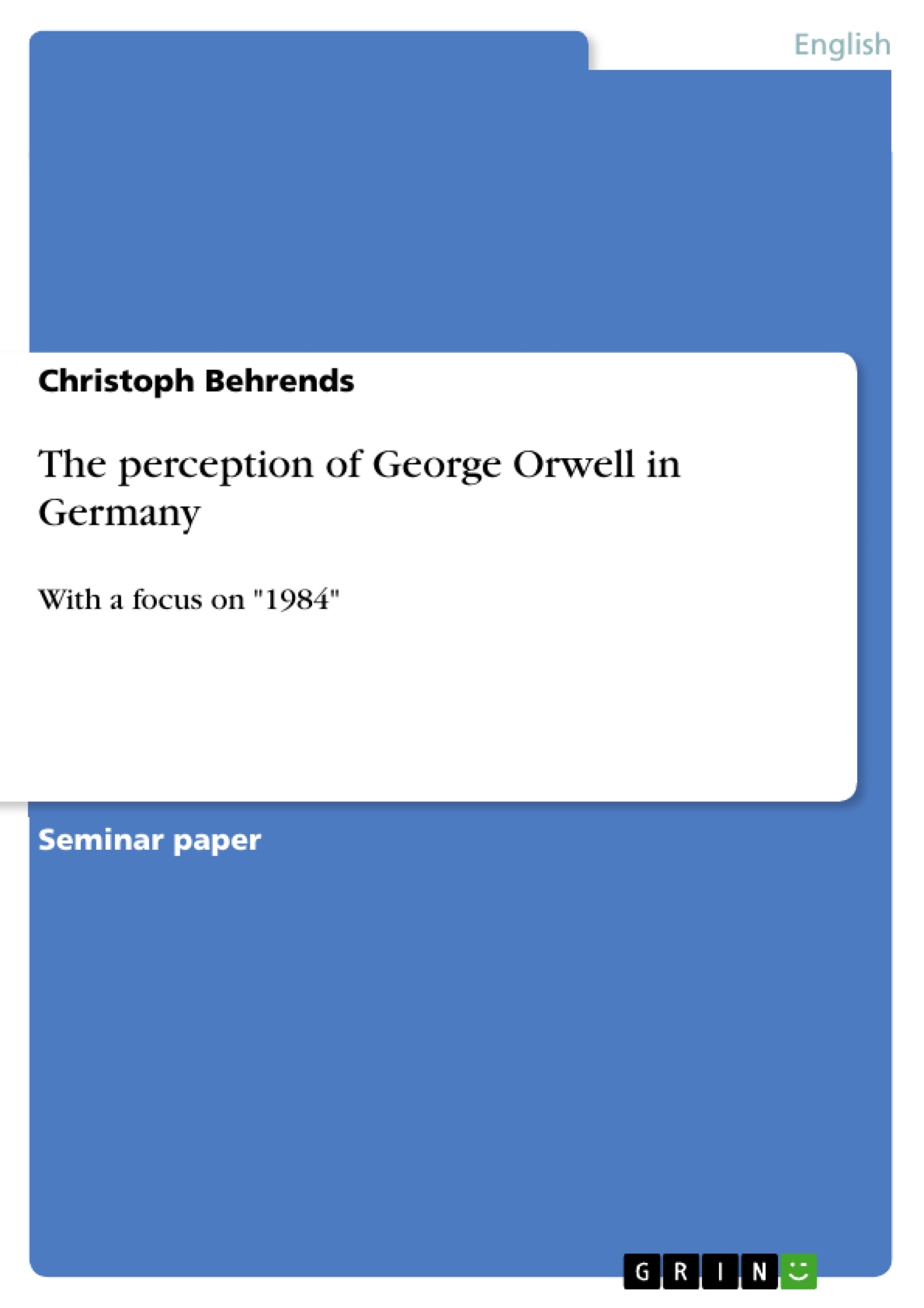When George Orwell’s „1984“ was published about 50 years ago, heavy discussions about its content arose. While being interpreted as criticism on Stalin’s system on one side, the other side read it as a warning concerning the consequences of capitalism. In the East German Republic people have even been arrested for reading and passing on „1984“.
The novel has been element of English classes in German schools for many years, so Orwell’s thoughts are passed on from generation to generation. While many scientists from the US and UK analysed the truthfulness of the story in the early 1980ies, in Germany only a few texts were published about it. This work evaluates the available literature in order to find out what the people in Germany thought about “1984” when the anti-utopian future became present.
Inhaltsverzeichnis (Table of Contents)
- Introduction
- Conception of the World and Structure of Society
- Formation of States
- War
- Ideology
- The Observation State
- Elements of total control
- Orwell's concepts „Doublethink“ and „Newspeak”
- The self definition of the state
- The Media
- Personalising enemies
- Information
- Results
- Literature
Zielsetzung und Themenschwerpunkte (Objectives and Key Themes)
This work examines the reception of George Orwell's "1984" in Germany, particularly focusing on the reactions to the novel's depiction of a totalitarian future. The main objective is to analyze the available literature on "1984" and to determine how people in Germany viewed the novel in the context of the Cold War and the emerging reality of the anti-utopian future.
- The totalitarian state and its control mechanisms
- The role of media and propaganda in shaping societal perceptions
- The relationship between the novel's themes and contemporary political realities
- The impact of "1984" on German society and culture
- The reception of "1984" in the context of the Cold War
Zusammenfassung der Kapitel (Chapter Summaries)
The first chapter introduces the context of "1984" and its impact on German society. It discusses the novel's reception in the East German Republic and the subsequent inclusion of the novel in English classes within German schools. The chapter highlights the importance of understanding how "1984" resonated with German audiences.
Chapter two explores the novel's conception of the world and its social structure. It delves into the formation of the three super-states, their internal divisions, and the ongoing war that sustains the totalitarian regime. The chapter also examines how Orwell's depiction of the state reflects the political realities of the Cold War, drawing parallels between the novel and the Cold War's power dynamics.
The third chapter analyzes the observation state as depicted in "1984", focusing on the elements of total control, the concepts of "Doublethink" and "Newspeak", and the state's self-definition. The chapter explores the effectiveness of these control mechanisms in shaping the thoughts and actions of citizens within the totalitarian regime.
Chapter four investigates the role of media in the totalitarian society, analyzing the manipulation of information and the personalization of enemies. The chapter discusses how propaganda is employed to control and direct the population's understanding of reality.
Schlüsselwörter (Keywords)
The main keywords and focus topics of this work include totalitarianism, surveillance, propaganda, media manipulation, "1984", George Orwell, Cold War, East Germany, Germany, anti-utopian literature, and reception studies.
Frequently Asked Questions
How was George Orwell's "1984" received in Germany?
The novel sparked heavy discussions; in West Germany, it was a staple of English classes, while in East Germany (GDR), people were sometimes arrested for possessing it.
What are the core concepts of "Doublethink" and "Newspeak"?
Doublethink is the ability to hold two contradictory beliefs simultaneously, and Newspeak is a controlled language designed to limit freedom of thought.
How does the novel reflect the Cold War era?
Orwell’s depiction of super-states and total surveillance mirrored the power dynamics and ideological battles between the East and West during the Cold War.
What is the role of media in "1984"?
The media is used for total control, personalizing enemies (like Goldstein), and manipulating information to sustain the totalitarian regime's power.
Why did discussions about the book intensify in the early 1980s?
As the actual year 1984 approached, many people evaluated the "truthfulness" of Orwell's predictions against the contemporary political reality.
- Arbeit zitieren
- Christoph Behrends (Autor:in), 2003, The perception of George Orwell in Germany, München, GRIN Verlag, https://www.grin.com/document/82662



